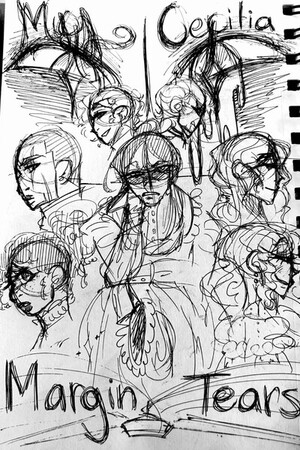Chapter 44:
Tries and Trials
Margin Tears: My Cecilia
The library alcove had given Cecilia a taste of possibility. It was not enough anymore to bend candles or coax seams; she needed to know whether the manor itself could be remade. The book seemed to agree. Its latest passage, scrawled in a curling hand, seemed to pulse as if written for her alone:
"To alter the chamber is to alter the tale. But beware—he who spins the tale will tug the thread when he feels your hand upon it."
She had read the line a dozen times that day. Each repetition set her teeth on edge, equal parts warning and challenge.
That night, long after the house quieted, Cecilia slipped into the drawing room. The air was heavy with the scent of roses, though no fresh bouquet had been delivered in days. A perfect stage, she thought grimly.
She laid her hand on the velvet drapes, whispering the book’s riddled instructions. The fabric rippled faintly, the crimson dye bleeding darker under her touch until it looked almost black. Encouraged, she shifted her focus outward. The furniture bent subtly, rearranging itself a few inches at a time as if sliding on unseen tracks. A chair turned toward her. A painting adjusted its angle to face her directly.
Her stomach lurched. The entire room was listening.
She pressed harder, stretching her will. For a breathless instant, the walls themselves shifted, extending farther apart, the ceiling lifting higher—an impossible expansion. A thrill shot through her. She had bent the house itself.
Then she froze.
The air went cold. The roses’ perfume curdled into something cloying, rotten. The drapes she had darkened quivered as if breathing. And from the shadows across the room, a soft sound broke the silence: a laugh.
Not loud, not even mocking—Just a quiet, deliberate exhalation of amusement.
Cecilia’s heart slammed. She spun toward the sound. Nothing. No one. The room appeared empty, save for the furniture she had rearranged. But she knew better. The laugh had been too intentional. He was here, testing her.
Her pulse raced. She forced herself to keep going. If she stopped now, she would admit fear, and fear was submission. She turned her attention to the roses on the side table. Their stems lengthened under her will, thorns sprouting and curling until they threatened to spill from the vase.
The laugh came again, sharper this time, laced with disapproval.
And then the trap sprung.
The thorns lashed outward—not at the vase, not at the table, but at her. They coiled like snakes, whipping toward her wrists. Cecilia gasped and staggered back, barely pulling her hands free as the vines snapped inches from her skin. The roses twisted violently, their blossoms blooming too fast, too wide, until petals scattered across the rug like drops of blood.
The furniture she had shifted lurched back into place with bone-jarring force. The painting slammed crooked against the wall. The room seemed to shudder, as if the house itself were shaking her hand off its skin.
Her breath caught. He was not merely watching—He was retaliating, setting snares where she meddled, forcing the world to bite her in return.
For one terrible moment, the drapes parted on their own. Beyond them, there was no window, no moonlight—only a blank white void, pulsing faintly like an exposed wound. It reached for her, pulling at her edges, as though eager to swallow her into nothingness.
Cecilia clenched her fists, whispering the book’s counter-words, steadying herself against the pull. The void wavered. Slowly, painfully, the drapes drew shut again, sealing the wound.
She collapsed against the chair, trembling, her breath ragged. Her experiments had ceased being games of curiosity; they were battles now, each success answered with his hand tightening around her throat.
And yet—beneath her terror—Cecilia felt something else—Triumph.
Because despite the trap, despite the laugh, despite the house lashing back, she had bent the manor to her will. She had pushed and, however briefly, it had yielded.
She rose on shaking legs, whispering through clenched teeth:
“You can set your snares, you can laugh, but listen here, you absolute coward-moron—You cannot undo the cracks. They’re here, and I will tear them even wider."
The room stilled. The roses withered instantly, their petals collapsing into dry husks.
She left the drawing room with her heart pounding, every step heavy with both dread and defiance. Olrin knew, and he would escalate, but so would she.
And next time, she vowed, she would not be caught in his snare so easily.
…
Cecilia had grown bolder, perhaps recklessly so. Each night brought her further into the manor’s seams, her fingers pressing into the soft edges of its fabric, tugging, reshaping. Tonight, she crept into the music room. It was lavish, lined with mirrors, its grand piano gleaming under the pale light of the chandelier. The room always felt heavy with echoes, as though sound lingered here too long.
She lit no candles. Instead, she worked in the half-dark, her book open on the polished piano lid. The latest riddle read:
"Strike not the note you hear, but the one that waits in silence. A song unheard can undo the world."
Her hands shook as she pressed the piano key. No sound came. She pressed another. Silence. A third—and this time, the note rang out, low and resonant, though she had not touched the ivory. The vibration rippled through her bones.
The air thickened. The mirrors along the walls trembled faintly. She pressed again, experimentally, and the chandelier swayed as if stirred by unseen wind. Her pulse spiked. She was bending sound itself.
But before she could exult, the tone warped.
The note she had conjured deepened unnaturally, dropping lower and lower until it was no longer music but a groan—a guttural vibration that clawed through her chest and made her stomach churn. Her hands flew to her ears, but it was useless; the sound came from inside her skull.
And then, from the mirrors, he stepped forth.
Not in flesh, but in reflection. His figure multiplied a hundredfold, each mirror carrying his cold, elegant silhouette, his eyes sharp and merciless. He did not shout. He did not even raise his voice. His words slid under the oppressive groan, wrapping around her mind:
“Do you believe you can play with my composition, girl? Do you think you can take my song and make it your own?”
Cecilia staggered back, clutching the piano for balance. “It isn’t yours alone,” she spat, though her voice shook. “The cracks exist whether you like it or not. I only press where the seam is weak.”
His many reflections smiled—thin, humorless. “Weakness you mistook for opportunity. A seam you mistook for freedom. But every tear you make belongs to me. Every distortion sings my refrain.”
The groaning note shifted, transforming into words. Her name, Cecilia, repeated in deep, drawn-out echoes that overlapped and layered until the sound filled her lungs, her veins, her very blood. CECILIA. CECILIA. CECILIA.
She pressed her hands tighter to her ears, but the mirrors reverberated with the chant, her own face reflecting back at her with his eyes staring out from them. She gasped, stumbling toward the drapes, desperate for air.
“Tell me, little maid,” his voice rumbled from every surface, “how long do you think your mind can endure bending against mine? A string pulled too tight does not sing—it snaps.”
The chandelier above shook violently. Crystals rained down, shattering on the floor like falling teeth. She flinched, but refused to collapse. With all her remaining will, she slammed the piano lid shut. The sound cut off abruptly.
The mirrors went dark. The air stilled. Silence reigned again.
Cecilia’s chest heaved, sweat beading at her temples, her legs weak beneath her. For a long moment, she thought she had ended it—cut his attack short.
But then his voice, low and close, slithered behind her ear. “You learn quickly. Good. I prefer my toys resilient. But remember this—each experiment you attempt is mine before it is yours. I can twist it, shape it, and use it against you at a whim. And next time, I will not stop before the string breaks.”
The air lightened. The presence withdrew. The mirrors reflected only her again—pale, wide-eyed, trembling.
Cecilia sank to the floor, her hands pressed against the cold marble tiles. Her defiance flickered, fragile against the memory of his voice tearing through her very body. And yet, even through the terror, something smoldered.
If he could twist her manipulations, then she had truly touched his domain. If she could hold her ground, even barely, then perhaps one day she could twist him.
She closed the book, clutching it to her chest, and whispered hoarsely:
“I won’t snap. Not for you.”
The piano loomed silent behind her, but its keys seemed to gleam faintly, as if daring her to play again.




Please sign in to leave a comment.